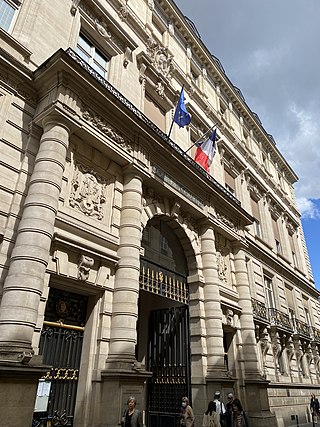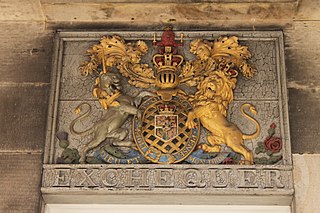
The comptroller and auditor general (C&AG) in the United Kingdom is the government official responsible for supervising the quality of public accounting and financial reporting. The C&AG is an officer of the House of Commons who is the head of the National Audit Office, the body that scrutinises central government expenditure.

In the civil service of the United Kingdom, His Majesty's Exchequer, or just the Exchequer, is the accounting process of central government and the government's current account in the Consolidated Fund. The term is used in various financial documents, including the latest departmental and agency annual accounts.
In many states with political systems derived from the Westminster system, a consolidated fund or consolidated revenue fund is the main bank account of the government. General taxation is taxation paid into the consolidated fund, and general spending is paid out of the consolidated fund.

The National Audit Office (NAO) is an independent Parliamentary body in the United Kingdom which is responsible for auditing central government departments, government agencies and non-departmental public bodies. The NAO also carries out value for money (VFM) audits into the administration of public policy.
A comptroller is a management-level position responsible for supervising the quality of accounting and financial reporting of an organization. A financial comptroller is a senior-level executive who acts as the head of accounting, and oversees the preparation of financial reports, such as balance sheets and income statements.

The Cour des Comptes is France's supreme audit institution, under French law an administrative court. As such, it is independent from the legislative and executive branches of the French Government. However, the 1946 and 1958 French constitutions made it the Court's duty to assist the Cabinet and Parliament in regulating government spending. The Court thus combines functions of a court of exchequer, comptroller general's office, and auditor general's office in common-law countries. It is also a Grand Corps of the French State and mainly recruits among the best-ranked students graduating from the Ecole nationale d'administration.
Comptroller general or comptroller-general or controller general may refer to:
The Comptroller and Auditor General of India is the supreme audit institution of India, established under Article 148 of the Constitution of India. They are empowered to audit all receipts and expenditure of the Government of India and the State Governments, including those of autonomous bodies and corporations substantially financed by the government. The CAG is also the statutory auditor of Government-owned corporations and conducts supplementary audit of government companies in which the government has an equity share of at least 51 percent or subsidiary companies of existing government companies. The CAG is also the statutory auditor of the Lokpal.
The Committee of Public Accounts is a select committee of the British House of Commons. It is responsible for overseeing government expenditures, and to ensure they are effective and honest. The committee is seen as a crucial mechanism for ensuring transparency and accountability in government financial operations, having been described by Professor the Lord Hennessy as "the queen of the select committees...[which] by its very existence exert[s] a cleansing effect in all government departments".

Indian Audit and Accounts Service (IA&AS) is a group 'A' central civil service under the Comptroller and Auditor General of India, the supreme audit institution of India. Its central civil servants serve in an audit managerial capacity in the Indian Audit and Accounts Department (IA&AD), and are responsible for auditing the accounts of the Union government and state governments, as well as their public commercial enterprises and non-commercial autonomous bodies. The service's role is analogous to the US Government Accountability Office and the UK National Audit Office.

The New York State Comptroller is an elected constitutional officer of the U.S. state of New York and head of the New York state government's Department of Audit and Control. Sixty-one individuals have held the office of State Comptroller since statehood. The incumbent is Thomas DiNapoli, a Democrat.

The Scottish Exchequer had a similar role of auditing and deciding on royal revenues as in England. It was not until 1584 that it also became a court of law, separate from the King's Privy Council. Even then, the judicial and administrative roles never became completely separated into two bodies, as with the English Exchequer. The Auditor of the Exchequer played a pivotal role in this important office of state.

State auditors are fiscal officers lodged in the executive or legislative branches of U.S. state governments who serve as external auditors, financial controllers, bookkeepers, or inspectors general of public funds. The office of state auditor may be a creature of the state constitution or one created by statutory law.
The Office of the Auditor General Manitoba—known as the Audit Office (1876–1916), Office of the Comptroller-General (1916–69), and Office of the Provincial Auditor (1969–2001)—is an independent office of the Legislative Assembly of Manitoba whose stated purpose is to assist Members of the Legislative Assembly with matters such as accountability and the performance of government.
Auditor of the Imprests was a profitable office of the Exchequer, responsible for auditing the accounts of officers of the English crown to whom money was issued for government expenditure, from 1559 to 1785.
The Comptroller General of the Exchequer was a position in the Exchequer of HM Treasury between 1834 and 1866. The Comptroller General had responsibility for authorising the issue of public monies from the Treasury to government departments.

The Office of the Comptroller and Auditor General of Bangladesh (C&AG) is the Supreme Audit Institution (SAI) of the country. Like the SAIs in many other countries across the world the institution is established by the Constitution of Bangladesh. This institute is responsible for maintaining accounts of the republic and audits all receipts and expenditure of the Government of Bangladesh, including those of bodies and authorities substantially financed by the government. The reports of the CAG are discussed by the Public Accounts Committee, which is a standing committee in the Parliament of Bangladesh.
The Comptroller and Auditor General (C&AG) is the constitutional officer responsible for public audit in Ireland. The Office of the Comptroller and Auditor General is the public audit body for the Republic of Ireland and is headed by the C&AG.
The Commissioners of Audit had responsibility from 1785 to 1866 for the auditing of public accounts in the United Kingdom.
The auditor-general of Ghana is the head of the Ghana Audit Service, a legislative branch agency re-established by the government of Ghana in 1992 through the 1992 Constitution of Ghana. It was established as part of the Audit Service through Article 188 of the 1992 Constitution of Ghana as part of the Public Services of Ghana. The auditor-general through the Audit service undertakes audits of the public accounts of Ghana and all public offices as mandated by Article 187 of the 1992 Constitution of Ghana.









